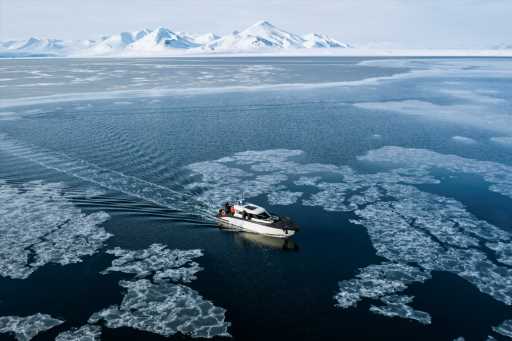By Danielle Bochove, Bloomberg
Even in a best-case scenario, the Arctic will begin to experience summer months with no sea ice sometime around the middle of the century — sooner than leading climate scientists had predicted, new research finds.
The United Nations-sponsored Intergovernmental Panel on Climate Change suggested in its most recent landmark report that the region would start to see Septembers without sea ice around 2050 if humans continue to emit greenhouse gases at high or moderate levels. However, the new study, published Tuesday in Nature Communications, says this will happen even in a low-emissions scenario. Higher emissions will result in ice-free Septembers by 2030 to 2040.
“We basically are saying that it has become too late to save the Arctic summer sea ice,” said Dirk Notz, an oceanographer at the University of Hamburg in Germany who specializes in sea ice and is one of the authors of the study, as well as an IPCC report author. “There’s nothing really we can do about this complete loss anymore, because we’ve been waiting for too long.”
While the IPCC speculated that an ice-free summer would likely take place for the first time before 2050, the models it looked at allowed for some hope that a low-emissions path could postpone such a grim milestone, Notz said.
Arctic sea-ice coverage is typically lowest in September, at the end of the summer, before growing again in the colder, darker autumn and winter months and peaking in March. Its loss has global repercussions.
As the difference in temperature between the Arctic and lower latitudes narrows, fluctuations in the jet stream will become more intense. A warmer Arctic will quicken permafrost melt, releasing more greenhouse gases into the atmosphere, accelerating a dangerous feedback loop. The Greenland ice sheet would likely melt more quickly as well, meaning higher seas.
“If there is Arctic sea ice melting faster than predicted, then what we can immediately expect is Arctic warming will be faster,” said Seung-Ki Min, a study and IPCC author and an environmental science professor at South Korea’s Pohang University of Science and Technology.
Read more: Tides Are Eating Into Glaciers, Triggering More Melting, Study Finds
The new study advances previous research by separating and quantifying the impact of human-made, or anthropogenic, greenhouse gases on ice loss from other natural factors that can cause variability in the data, like volcanic eruptions. It found that about 90% of Arctic sea-ice melting is caused by the former, versus 10% by natural forces.
When that now-measurable human impact is integrated into climate models, it provides a clearer picture of when the ice will disappear than other methods — for example, trying to extrapolate from past temperature trends, said Mark Serreze, director of the National Snow & Ice Data Center at the University of Colorado Boulder, who was not involved with the study.
“We are destined to lose the end of summer sea ice in the Arctic in the future,” Serreze said. “The question has always been when, and the question of when is complicated by a number of factors.”
These include flaws in existing climate models and a huge amount of natural variability in climate data. Within any given year, changes in weather patterns are almost impossible to predict, while phenomena like El Niño or La Niña can cause swings that last several years.
Knowing that the loss of sea ice is primarily being caused by human activity means people can work to slow that loss, said Notz. But as climate modeling improves, he predicts there will be more bad news to come. “I am expecting that more and more of these kind of studies will come out, looking at other parts of the Earth system, that will also say: ‘We’ve been warning you all the time; you didn’t react and now it’s too late to do something.’”
With assistance from Eric Roston.
More stories like this are available on bloomberg.com.
Get more Colorado news by signing up for our daily Your Morning Dozen email newsletter.
Source: Read Full Article
-
1.6 tonnes of cocaine seized from secret truck compartment in ‘historic’ bust
-
Japanese police put former Greens candidate under three-month ban on visitors
-
Call for more Bourke Street protection after driver charged with murder
-
Ukraine shoots down 80 Iranian-made ‘kamikaze’ drones in 2 days, says Zelenskyy
-
Feds cite efforts to obstruct probe of docs at Trump estate – The Denver Post

